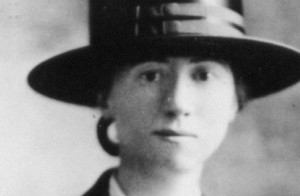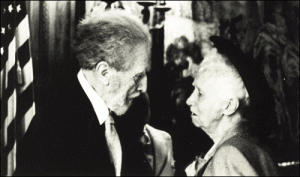I live in the oldest incorporated suburb of St. Louis, a town of 27, 540 called Kirkwood. It became a town in 1853, when a rail line was extended west. The project manager for the line was a surveying engineer from New York named James Pugh Kirkwood.
For the first 40 or 50 years of its life, Kirkwood was likely typical of towns in the 19th century Midwest — small town center serving both the rail line and the farms in the surrounding region. Merchants, clergymen, and others built homes near the town center, many of which survive today in good working order.
This was the town and culture where poet Marianne Moore was born in 1887. Her grandfather, the Rev. John Warner, had been a chaplain at the Battle of Gettysburg and was called to be pastor of the First Presbyterian Church of Kirkwood in 1867. Moore and her family lived with her grandparents until 1896, when Warner died and the family moved back to Pennsylvania. (The church still exists, although not the original church building.)
From Carlisle, Pennsylvania, it was Bryn Mawr College (Moore received a B.A. degree), a commercial school, and a teaching stint, until she and her mother moved to New York City in 1918. She worked at the New York Public Library and later served as acting editor of a literary magazine, The Dial. Moore lived in Brooklyn until her death in 1972. She won numerous recognitions for her poetry, including the 1952 Pulitzer Prize for her Collected Poems.
 My edition of her Complete Poems is the paperback edition published by Penguin Books in 1994. The original version was published in 1967, and other editions have been subsequently published. Mine includes several poems previously unpublished, along with some of her prose as well; it contains the poems from all 11 of her published works, from 1921 to 1966. And yet the Complete Poems is still a relatively slender volume.
My edition of her Complete Poems is the paperback edition published by Penguin Books in 1994. The original version was published in 1967, and other editions have been subsequently published. Mine includes several poems previously unpublished, along with some of her prose as well; it contains the poems from all 11 of her published works, from 1921 to 1966. And yet the Complete Poems is still a relatively slender volume.
Through her work at The Dial, Moore got to know such poets as Wallace Stevens and William Carlos Williams, Ezra Pound, and “H.D., ” a.k.a Hilda Doolittle, poets who were part of the “Imagist” movement (H.D. published Moore’s first volume of poetry without Moore’s knowledge). From our vantage point, we would say she was squarely in the middle of the Modernist period in American literature.
And yet, for all of her modernist associations, Moore’s poetry didn’t exactly fit the category. There’s a richness, almost a lushness, in many of her poems that’s absent from the moderns. She ranged over history and literature — Rome and Greece, Britain and Ireland, and America — as well as music and the natural world. (I’ve read only one poem about weasels, and Marianne Moore wrote it.)
Moore wrote story poems, too, including one entitled “Marriage” that runs to nine pages. And a poem on baseball. Her poetic eye ranged over all of life, like this one, “No Swan So Fine”:
“No waters as still as the
dead fountains of Versailles.” No swan,
with swart blind look askance
and gondoliering legs, so fine
as the chintz china one with fawn-
brown eyes and toothed gold
collar on to show whose bird it was.
Lodged in the Louis Fifteenth
candelabrum-tree of cockscomb-
tinted buttons, dahlias,
sea-urchins, and everlastings,
it perches on the branching foam
of polished sculptured
flowers—at ease and tall. The king is dead.
Read that one aloud (the Poetry Foundation has a reading of the poem by Melissa Severin). Her poems are best read aloud, and slowly, to hear the music and interior sense of rhyme, order, and alliteration. She was a modernist who wasn’t a modernist.
While these qualities of her poetry likely come from the experiences of a lifetime, I like to think that those first years of her early life in Kirkwood were critical.
She wouldn’t recognize most of the town today. But a number of the homes, a few downtown buildings, even the 1893 train station (yes, we have a functioning Amtrak station) might be familiar. And she might still recognize the spirit of the place, for it has not changed that much in the 117 years since she left.
I can imagine a little girl, dressed in her 1890s dress and with ribbons in her hair, walking unpaved streets, past her grandfather’s church, stepping carefully around the ubiquitous horse droppings. She’s going to the general store across from the train station, the store with its farm implements and seed, dry goods and feed, and the occasional candies offering sweetness and excitement, making the walk worthwhile. And all of this would become stored for later use by her poetic eye.
Kirkwood’s streets are paved now, and the horse droppings and wagons long gone. But you can walk by the Fishback House (1867) and Mudd’s Grove (1859), and many others, and still hear the sounds of her poetry in the air, if you listen closely enough.
Photograph by Fortimbras. Sourced via Flickr. Post by Glynn Young, author of the novels Dancing Priest and the recently published A Light Shining.
________________
Buy a year of happy work mornings today, just $5.99. In June we’re exploring the theme Mirror, Mirror.
- Poets and Poems: Donna Vorreyer and “Unrivered” - October 7, 2025
- Poet Sidney Lanier and the Lost Cause - October 2, 2025
- Poets and Poems: A.J. Thibault and “We Lack a Word” - September 30, 2025


Jerry says
Excellent review. I read it out loud before your suggestion. I read poetry out loud 90% of the time. Her poetry is rubbing off into yours Glynn. The Kirkwood muse is still hangin’ round.
Mary Sayler says
Interesting article about an interesting poet, Glynn! Thanks. Moore brought flair to her poems – and also to her discussions of her work. I especially like how her poems developed musicality when read aloud even though she often wrote syllabic verse. That awakened me to the fact that rhythmic poems don’t necessarily need iambic pentameter.
Maureen Doallas says
When I was in Philly last summer I stopped at the Rosenbach (a wonderful museum) and got to see some of the Moore collection there, as well as her (reconstructed) living room from her Greenwich Village apartment. Some fascinating stuff there.
L. L. Barkat says
I am quite taken with the event of her poetry being published without her knowledge. How’d that go? Was she pleased? Displeased?
Imagine someone loving your stuff that much to go and do that 🙂